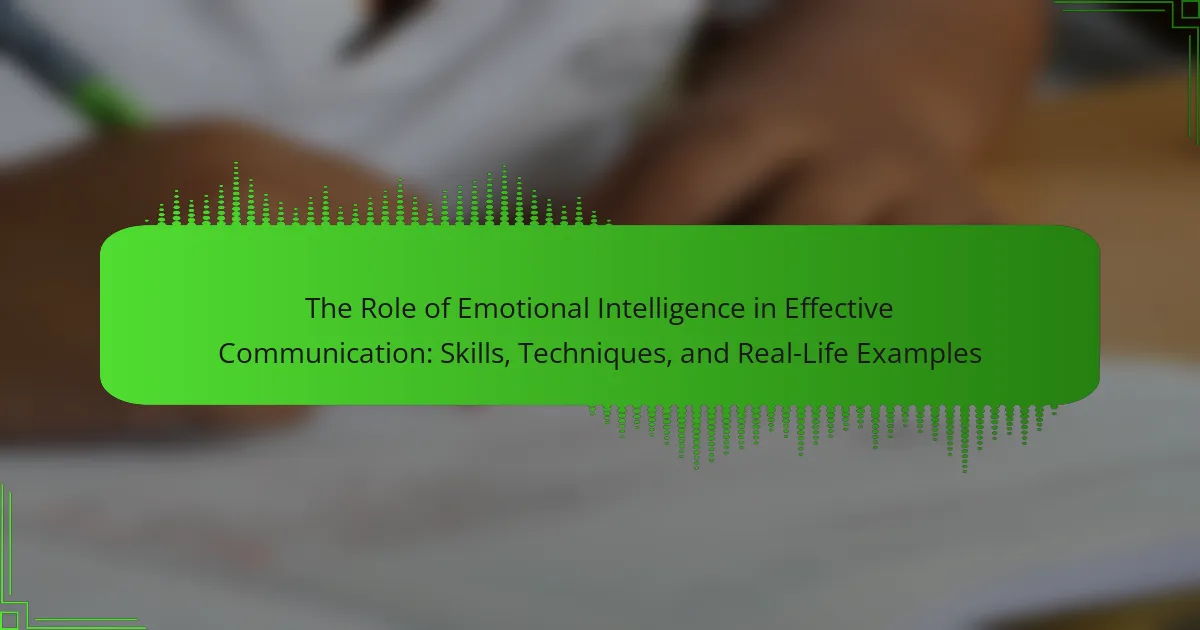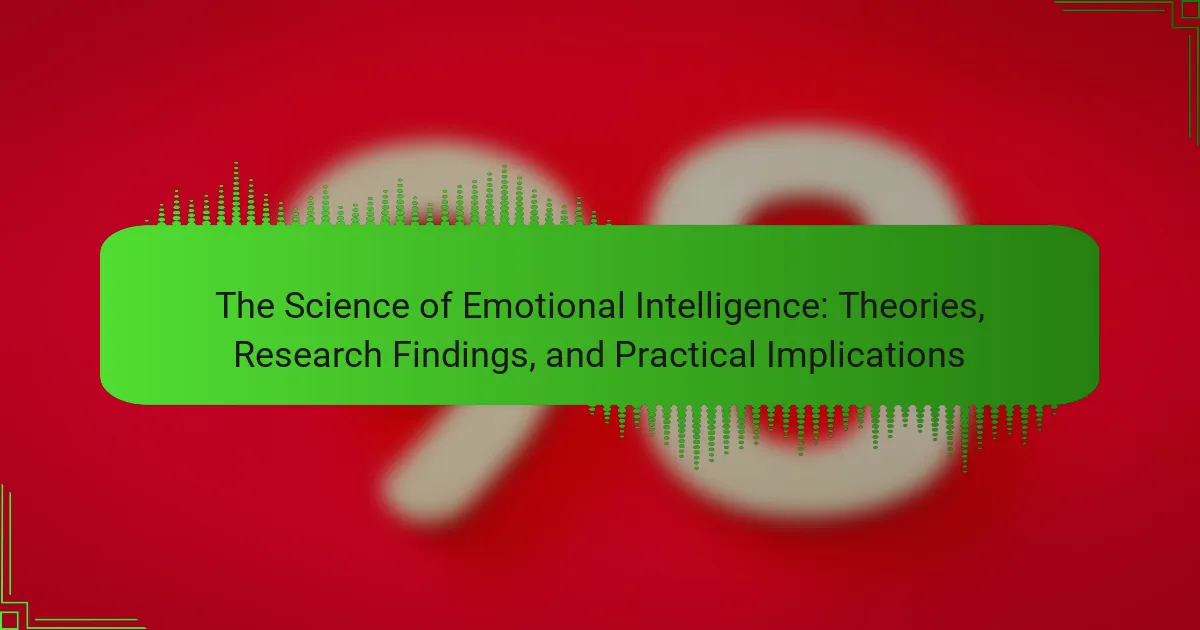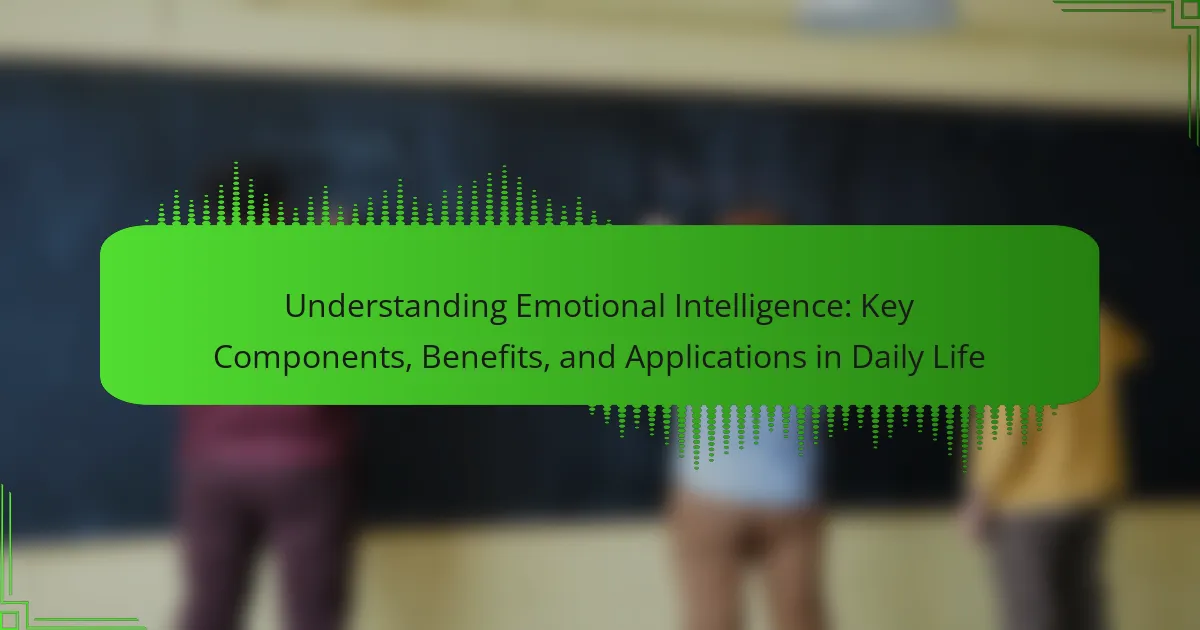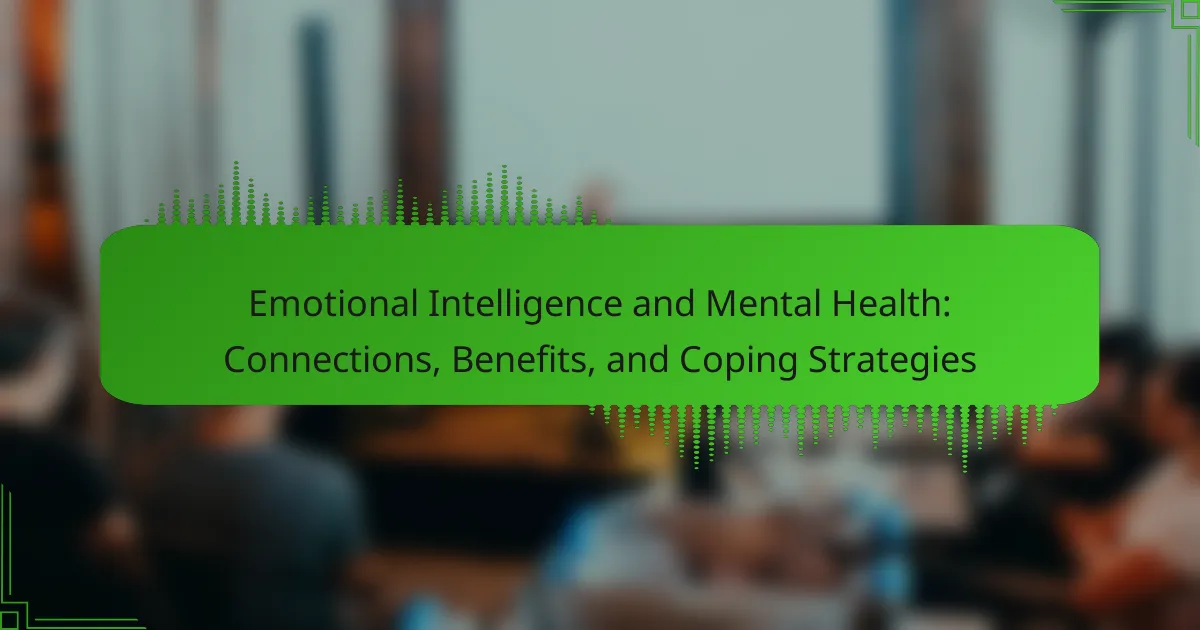Emotional intelligence is a critical factor in effective communication, enabling individuals to understand and manage their own emotions while recognizing the emotions of others. This ability fosters empathy, enhances interpersonal connections, and leads to clearer expression and appropriate responses in conversations. Key skills for developing emotional intelligence include self-awareness, empathy, active listening, and emotional regulation, which collectively contribute to improved relationships and conflict resolution in both personal and professional settings. Additionally, techniques such as nonverbal communication, open-ended questioning, and constructive feedback further support meaningful dialogue and collaboration. Research indicates that teams with high emotional intelligence experience fewer conflicts and greater success in their interactions.
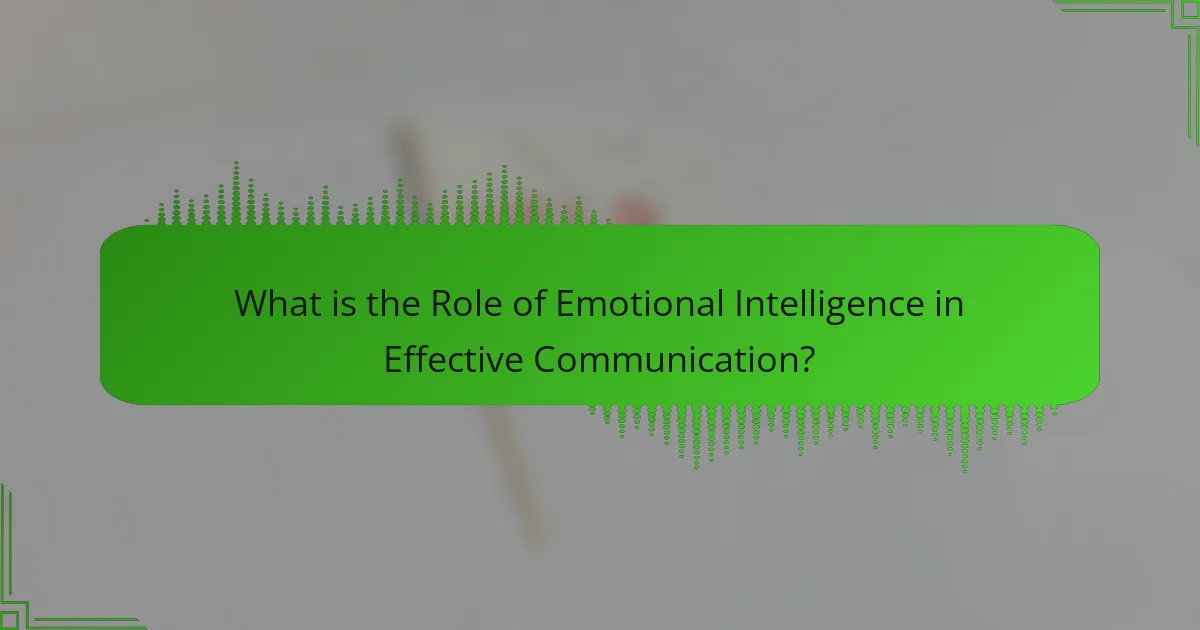
What is the Role of Emotional Intelligence in Effective Communication?
Emotional intelligence plays a crucial role in effective communication. It enables individuals to understand and manage their own emotions. This understanding helps in recognizing the emotions of others. High emotional intelligence fosters empathy, which enhances interpersonal connections. Effective communicators can express themselves clearly and respond appropriately to others’ feelings. Research shows that teams with high emotional intelligence perform better. They experience fewer conflicts and improved collaboration. Emotional intelligence directly influences relationship-building and conflict resolution. This leads to more productive and meaningful conversations.
How does emotional intelligence influence communication skills?
Emotional intelligence significantly enhances communication skills. It enables individuals to understand and manage their emotions and the emotions of others. This understanding leads to more effective verbal and non-verbal communication. Emotionally intelligent individuals can express themselves clearly and empathetically. They can also interpret others’ emotional cues accurately. Research shows that high emotional intelligence correlates with better conflict resolution skills. A study by Brackett et al. (2011) found that individuals with higher emotional intelligence perform better in interpersonal interactions. This demonstrates the critical role emotional intelligence plays in effective communication.
What are the key components of emotional intelligence?
The key components of emotional intelligence are self-awareness, self-regulation, motivation, empathy, and social skills. Self-awareness involves recognizing one’s emotions and their impact on thoughts and behavior. Self-regulation refers to managing one’s emotions in healthy ways. Motivation is the drive to pursue goals for personal reasons beyond external rewards. Empathy is the ability to understand and share the feelings of others. Social skills encompass the ability to build and maintain healthy relationships. Research by Daniel Goleman highlights these components as essential for effective communication and interpersonal relationships.
How does self-awareness impact communication?
Self-awareness significantly enhances communication effectiveness. It allows individuals to understand their own emotions, thoughts, and behaviors. This understanding leads to clearer expression of ideas and feelings. When people are self-aware, they can better recognize how their communication affects others. They can adjust their tone and body language accordingly. Research shows that self-aware individuals are more empathetic. They can listen actively and respond thoughtfully. This two-way understanding fosters stronger relationships and reduces misunderstandings. Overall, self-awareness is a crucial component of effective communication.
Why is emotional intelligence important in personal and professional interactions?
Emotional intelligence is crucial in personal and professional interactions because it enhances communication and relationship-building. Individuals with high emotional intelligence can recognize and understand their own emotions and those of others. This awareness leads to better empathy and conflict resolution. Studies show that emotional intelligence contributes to improved teamwork and collaboration. For instance, a report by the World Economic Forum highlights that emotional intelligence is one of the top skills needed for success in the workplace. Additionally, effective emotional management can lead to reduced stress and increased job satisfaction. Thus, emotional intelligence plays a vital role in fostering positive interactions and achieving professional goals.
How does emotional intelligence enhance relationship building?
Emotional intelligence enhances relationship building by fostering better understanding and communication between individuals. It allows individuals to recognize and manage their own emotions, which aids in responding appropriately to others. High emotional intelligence leads to increased empathy, enabling individuals to connect on a deeper level. This connection builds trust and rapport, essential components of strong relationships. Research indicates that teams with high emotional intelligence perform better due to improved collaboration and conflict resolution. According to a study by Goleman, emotional intelligence accounts for 67% of the competencies needed for effective leadership, highlighting its critical role in relationship dynamics.
What role does empathy play in effective communication?
Empathy is crucial for effective communication. It allows individuals to understand and share the feelings of others. This understanding fosters trust and rapport between communicators. Empathetic communication enhances active listening, ensuring all parties feel heard. It also helps to reduce misunderstandings and conflicts. Research shows that empathetic leaders are more successful in team dynamics. A study by Goleman (1998) highlights empathy as a key component of emotional intelligence. This emotional connection leads to more meaningful and productive conversations.
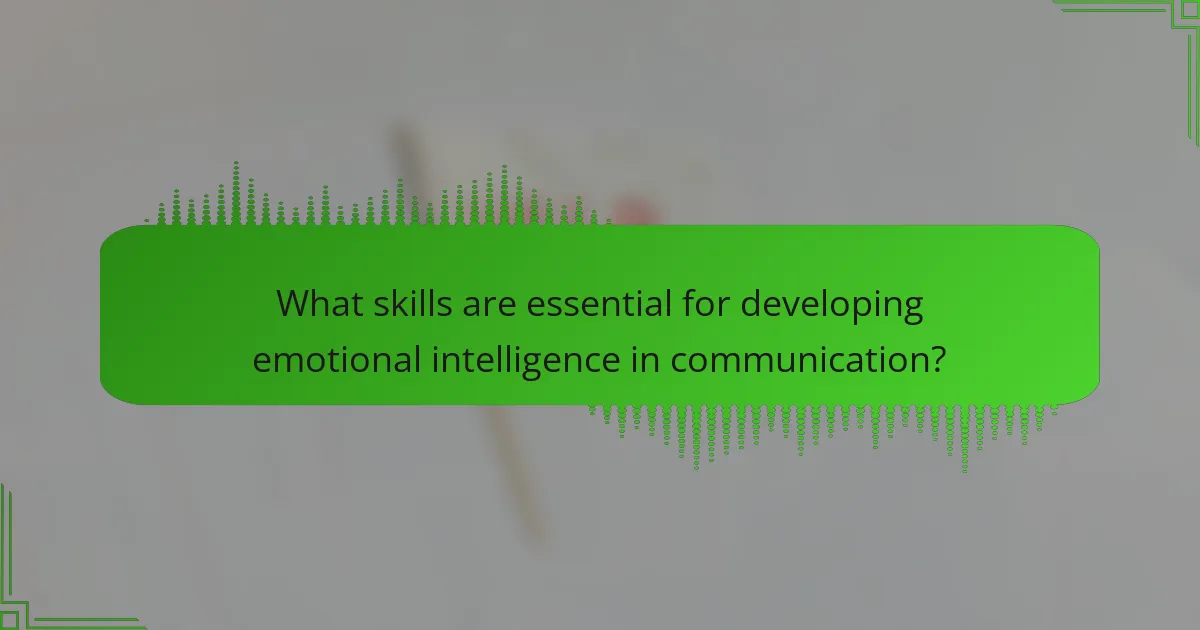
What skills are essential for developing emotional intelligence in communication?
Essential skills for developing emotional intelligence in communication include self-awareness, empathy, active listening, and emotional regulation. Self-awareness allows individuals to recognize their own emotions and how they affect communication. Empathy enables understanding others’ feelings and perspectives, fostering deeper connections. Active listening involves fully concentrating on the speaker, which enhances clarity and reduces misunderstandings. Emotional regulation helps manage one’s emotions during interactions, promoting constructive dialogue. Research indicates that these skills contribute to effective communication and improved relationships in both personal and professional contexts.
How can active listening improve emotional intelligence?
Active listening enhances emotional intelligence by fostering deeper understanding and empathy. It requires fully concentrating on the speaker, which promotes awareness of their emotions. This practice helps individuals recognize non-verbal cues, such as body language and tone. By engaging in active listening, one can respond more appropriately to others’ emotional states. Research indicates that effective communicators, who practice active listening, demonstrate higher emotional intelligence. A study published in the Journal of Applied Psychology found a positive correlation between active listening skills and emotional awareness. This connection underlines how active listening is vital for developing emotional intelligence in interpersonal interactions.
What techniques can be used to practice active listening?
Techniques to practice active listening include maintaining eye contact, nodding, and using verbal affirmations. These actions signal engagement and encourage the speaker. Paraphrasing the speaker’s message shows understanding and clarifies any confusion. Asking open-ended questions invites further discussion and elaboration. Summarizing key points reinforces retention and demonstrates attention. Avoiding interruptions allows the speaker to express thoughts fully. Finally, being aware of non-verbal cues enhances comprehension and connection. Research indicates that active listening improves interpersonal relationships and communication effectiveness (Brownell, 2012, “Listening: Attitudes, Principles, and Skills”).
How does active listening contribute to better understanding?
Active listening enhances understanding by ensuring that the listener fully comprehends the speaker’s message. It involves paying close attention to verbal and non-verbal cues. This technique fosters a deeper connection between the speaker and listener. Research shows that active listening improves retention of information. According to a study by Wolvin and Coakley, effective listening can increase comprehension by up to 50%. By clarifying and summarizing the speaker’s points, listeners can verify their understanding. This process reduces misunderstandings and promotes clearer communication. Overall, active listening is crucial for effective dialogue and relationship building.
Which emotional regulation strategies are effective in communication?
Effective emotional regulation strategies in communication include mindfulness, cognitive reappraisal, and emotional expression. Mindfulness helps individuals stay present and aware of their emotions. This awareness can lead to more thoughtful responses in conversations. Cognitive reappraisal involves reframing negative thoughts to alter emotional responses. Research shows that this strategy can reduce anxiety and improve communication clarity. Emotional expression allows individuals to convey their feelings appropriately. Studies indicate that expressing emotions can enhance understanding and connection between communicators. These strategies collectively foster better interactions and promote emotional intelligence in communication.
How can one manage emotions during challenging conversations?
To manage emotions during challenging conversations, one should practice active listening. Active listening involves fully concentrating on the speaker, which helps reduce emotional reactivity. It allows individuals to understand perspectives better and respond thoughtfully.
Additionally, maintaining a calm tone can influence the emotional climate of the conversation. A calm demeanor can prevent escalation and promote a more productive dialogue.
Taking deep breaths before responding can also help regulate emotions. This technique lowers stress levels and fosters clarity of thought.
Using “I” statements rather than “you” statements can minimize defensiveness. This approach encourages open communication without assigning blame.
Lastly, setting a positive intention for the conversation can frame the discussion constructively. Research indicates that focusing on mutual understanding leads to more effective outcomes.
What techniques help in maintaining composure while communicating?
Techniques to maintain composure while communicating include deep breathing, active listening, and positive self-talk. Deep breathing helps regulate emotions and reduces anxiety. Active listening fosters understanding and minimizes misunderstandings. Positive self-talk encourages a calm mindset and boosts confidence. These techniques are supported by research indicating that emotional regulation enhances communication effectiveness. For instance, a study by Gross (2002) highlights that managing emotions leads to better interpersonal interactions.
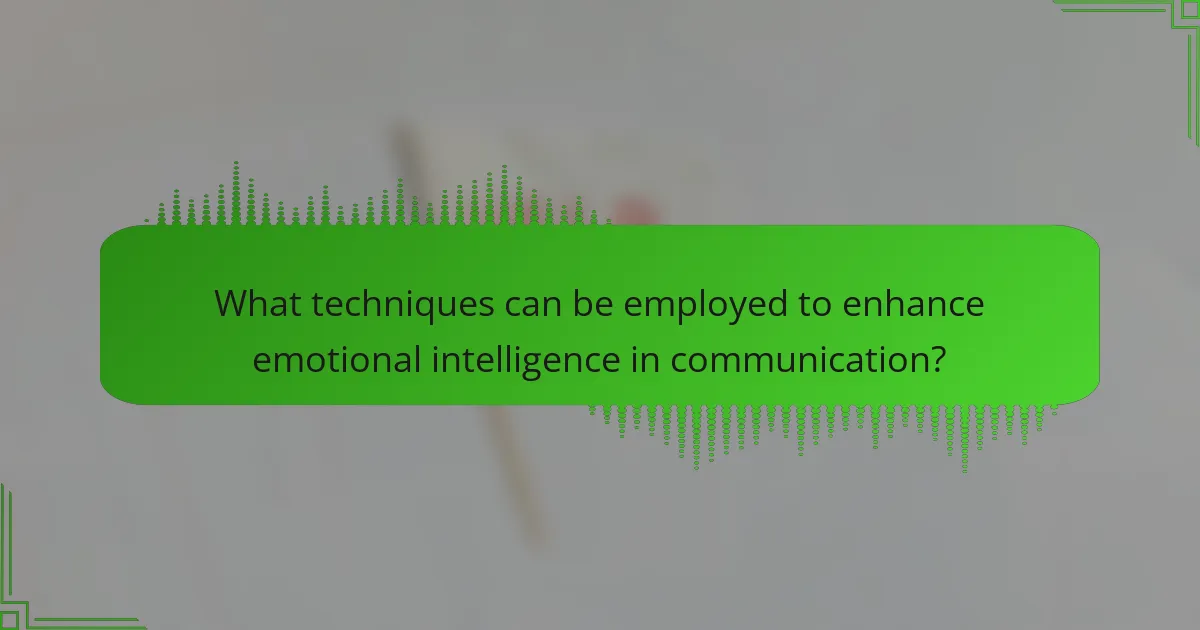
What techniques can be employed to enhance emotional intelligence in communication?
Active listening is a key technique to enhance emotional intelligence in communication. It involves fully concentrating on the speaker, understanding their message, and responding thoughtfully. Practicing empathy is another technique. It requires recognizing and validating others’ emotions to build rapport. Self-regulation is also important. It helps individuals manage their own emotional responses during interactions.
Additionally, nonverbal communication plays a crucial role. Body language, [censured] expressions, and eye contact can convey understanding and support. Asking open-ended questions encourages deeper dialogue and connection. Providing constructive feedback fosters a positive communication environment. Lastly, developing emotional awareness is essential. It allows individuals to identify their own emotions and how they affect communication.
How can mindfulness practices improve emotional intelligence?
Mindfulness practices can improve emotional intelligence by enhancing self-awareness and emotional regulation. These practices encourage individuals to observe their thoughts and feelings without judgment. This observation fosters a deeper understanding of one’s emotional responses. Increased self-awareness allows for better recognition of emotions in oneself and others. Mindfulness also promotes empathy by encouraging active listening and presence in interactions. Research shows that mindfulness training can lead to significant improvements in emotional regulation skills. A study published in the journal “Emotion” by Keng, Smoski, and Robins found that mindfulness is linked to higher emotional intelligence scores. This evidence supports the notion that mindfulness practices contribute positively to emotional intelligence development.
What are some practical mindfulness exercises for communication?
Practical mindfulness exercises for communication include active listening, mindful breathing, and nonverbal awareness. Active listening involves fully concentrating on the speaker. This enhances understanding and reduces miscommunication. Mindful breathing helps calm the mind before engaging in conversation. It promotes clarity and focus during discussions. Nonverbal awareness encourages individuals to observe body language. This aids in interpreting emotions and intentions accurately. These exercises foster emotional intelligence, which is crucial for effective communication. Studies show that mindfulness can improve interpersonal relationships and reduce conflict.
How does mindfulness affect emotional responses in conversations?
Mindfulness enhances emotional responses in conversations by promoting awareness and regulation of feelings. It allows individuals to observe their emotions without immediate reaction. This observation leads to more thoughtful responses rather than impulsive reactions. Mindful individuals can better empathize with others, improving interpersonal connections. Research indicates that mindfulness practice reduces emotional reactivity and increases emotional intelligence. A study by Keng, Smoski, and Robins found that mindfulness training significantly improved emotional regulation skills. This improvement facilitates more constructive communication and conflict resolution in conversations.
What role does feedback play in developing emotional intelligence?
Feedback is crucial in developing emotional intelligence. It provides individuals with insights into their emotional responses and behaviors. Constructive feedback helps identify strengths and areas for improvement. This process enhances self-awareness, a key component of emotional intelligence. Research indicates that people who receive regular feedback show greater emotional regulation. For example, a study by London and Smither (1999) found that feedback significantly improved self-perception and interpersonal skills. Thus, feedback fosters a deeper understanding of one’s emotions and enhances social interactions.
How can constructive feedback improve communication skills?
Constructive feedback can significantly improve communication skills by providing specific insights into one’s performance. It helps individuals identify areas for improvement. This feedback encourages active listening and thoughtful responses. Engaging with feedback fosters a growth mindset. Studies show that people who receive regular constructive feedback enhance their communication effectiveness. For example, a study published in the Journal of Applied Psychology found that employees who received constructive feedback improved their interpersonal communication skills by 25%. This improvement leads to better collaboration and understanding in various contexts. Therefore, constructive feedback is essential for developing strong communication abilities.
What are the best practices for giving and receiving feedback?
Best practices for giving feedback include being specific, timely, and constructive. Feedback should focus on observable behaviors rather than personal attributes. Use “I” statements to express your perspective and avoid making the recipient defensive. Ensure the feedback is actionable, providing clear steps for improvement. It is also important to balance positive and negative feedback to maintain motivation.
For receiving feedback, actively listen and avoid interrupting. Clarify any points that are unclear and ask for specific examples. Reflect on the feedback before responding, showing that you value the input. Thank the person for their feedback, regardless of its nature. This approach fosters a positive environment for open communication.
Research by Stone and Heen in “Thanks for the Feedback” emphasizes that effective feedback can enhance performance and relationships. Their findings show that individuals who engage with feedback constructively improve their skills and emotional intelligence.
What are some real-life examples of emotional intelligence in communication?
Empathy in active listening is a real-life example of emotional intelligence in communication. When a person listens attentively and acknowledges others’ feelings, it fosters trust. For instance, a manager who recognizes an employee’s stress during a project can provide support. This understanding can enhance team morale and productivity. Another example is conflict resolution through emotional awareness. A mediator who identifies underlying emotions can guide parties to a constructive dialogue. This approach often leads to satisfactory resolutions. Additionally, nonverbal communication reflects emotional intelligence. A speaker who uses appropriate [censured] expressions and body language can convey understanding. This can strengthen connections and engagement in conversations.
How do leaders use emotional intelligence to inspire teams?
Leaders use emotional intelligence to inspire teams by recognizing and managing their own emotions and those of their team members. This ability helps leaders create a positive work environment. They demonstrate empathy, which fosters trust and open communication. Leaders with high emotional intelligence can motivate their teams by understanding individual needs and aspirations. They effectively handle conflicts by addressing emotions constructively. Research indicates that emotionally intelligent leaders enhance team performance and satisfaction. A study published in the Journal of Organizational Behavior found that teams led by emotionally intelligent leaders reported higher engagement levels. This connection between emotional intelligence and team inspiration is well-documented and critical for effective leadership.
What are some case studies illustrating the impact of emotional intelligence in conflict resolution?
One case study illustrating the impact of emotional intelligence in conflict resolution involves a healthcare team dealing with a patient care disagreement. The team utilized emotional intelligence to understand each member’s perspective. They facilitated open communication, which led to a collaborative solution that improved patient outcomes.
Another case study features a corporate setting where a manager resolved a team conflict. The manager employed emotional intelligence to recognize the underlying emotions of team members. This approach fostered empathy and led to a resolution that enhanced team cohesion and productivity.
In educational settings, a case study showed a teacher mediating conflicts among students. By using emotional intelligence, the teacher helped students express their feelings and understand each other. This resolution technique not only solved immediate conflicts but also taught students valuable conflict resolution skills.
These case studies demonstrate that emotional intelligence is crucial in conflict resolution. They highlight how understanding emotions and fostering communication can lead to effective solutions.
What practical tips can enhance emotional intelligence for effective communication?
Developing emotional intelligence can significantly enhance effective communication. Practicing active listening is crucial. This involves fully concentrating on the speaker and acknowledging their message. It fosters understanding and empathy. Another tip is to recognize and manage your emotions. Being aware of your feelings helps you respond appropriately in conversations. Additionally, practicing empathy is essential. It allows you to understand others’ perspectives and feelings. Using clear and concise language also improves communication. It minimizes misunderstandings and clarifies intentions. Lastly, seeking feedback can provide insights into your communication style. Constructive criticism helps refine emotional intelligence skills. These strategies collectively contribute to more effective communication.
The main entity of this article is emotional intelligence and its significant role in effective communication. The article explores how emotional intelligence enhances communication skills through self-awareness, empathy, and active listening, while also discussing key components such as emotional regulation and social skills. It highlights the importance of emotional intelligence in personal and professional interactions, emphasizing its impact on relationship-building and conflict resolution. Additionally, the article provides practical techniques for developing emotional intelligence and real-life examples demonstrating its effectiveness in communication contexts.
